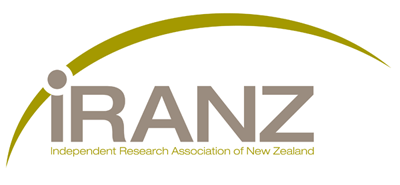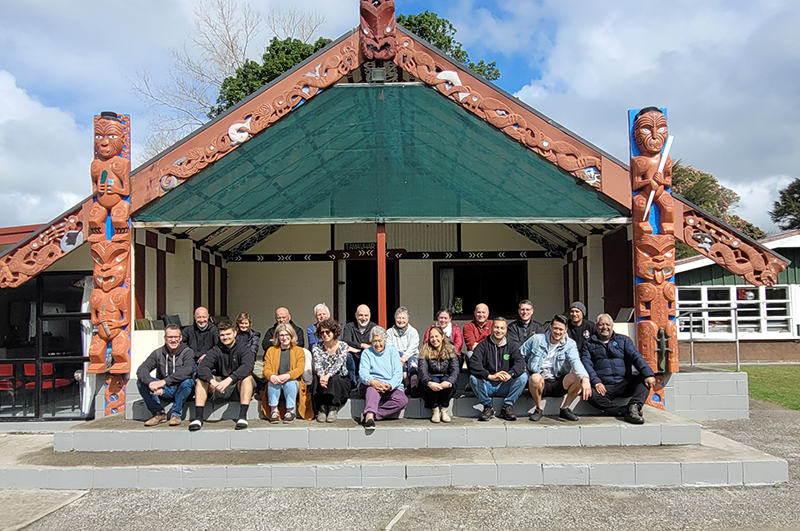Noho Marae furthers understanding of kaupapa Māori for IRANZ members
Te Rereatukāhia Marae, in Tauranga Moana rohe, played host in September for the Noho Marae (overnight marae stay) for IRANZ members.
The Noho Marae, for CEOs and other senior science leaders, was part of the Ngā Mahi Ngātahi Project to promote Equity, Diversity, and Inclusion (EDI). Funded by MBIE’s EDI Capability Fund, and led by Cawthron and Takarangi Research, the project aims to develop best practice EDI guidelines for the research and innovation sector in Aotearoa New Zealand.
Following on from an IRANZ survey of members’ current understanding and approach to kaupapa Māori (the philosophies and practices of being Māori, and the current and historical impacts of colonisation on Māori society), the Noho Marae was designed to improve members’ knowledge of the issues that relate to EDI in Aotearoa.
Themes
The themes that were covered included ‘Understanding Māori principles, concepts, and perspectives’; ‘Engaging with Māori communities’; and ‘Understanding Te Tiriti and its relevance to your organisation’.
Te Rereatukāhia Marae
“Ngāi Tamawhariua Poutiriao”
Te Rereatukāhia Marae exists within a living pā, about 30mins from Tauranga. For the local community of 600 people, Tamawhariua is their Whare Tupuna, and Ngai Tamawhariua is also the name of the hapū. The whakatuaki (Māori proverb) above relates to a local taniwha and is used as a guiding mantra for meeting the challenges that the hapū face.
As part of the first theme: Understanding Māori principles, concepts, and perspectives, IRANZ members heard about history of the area, including the confiscation of vast amounts of land and the restriction of the hapū on to remaining marginal areas, which are now threatened by climate change and require managed retreat of the established community.
Members heard about the financial poverty and the infrastructure challenges experienced in the community which stands in stark contrast to the surrounding rich horticulture area. Much of the pā has no town services, and use tank water and septic tank sewerage systems.
But attendees also heard about the resilience of the people and the wealth found in the experience of living in a pā, in community, and particularly with grandparents. They met inspiring members of the community who are working collectively to ensure the future of the hapū.
IRANZ particpants also experienced the wealth of the community through the generosity of the delicious kai (food) two trained chefs prepared over the weekend, the sharing of knowledge, and the support of one of the local kuia right throughout the Noho.
Improving the understanding of kaupapa Māori
Paora Tapsell, a Principal Researcher of the Takarangi Research Group, and Anaru Luke, Tumuaki Te Kāhui Āio at Cawthron Institute, outlined the genesis of the Ngā Mahi Ngātahi project.
IRANZ Kaitohutohu Mātauranga Rangimaria Aperahama presented the survey results (which was conducted earlier in the year). The themes for the Noho Marae came from this analysis.
Dr Karaitiana Taiuru of Taiuru & Associates spoke about Wai262. Wai262 is a Waitangi Tribunal claim initiated in the 1990s in relation to the protection of taonga Māori. Karaitiana spoke about the classification of Taonga Species, and the possible impacts and opportunities this claim may have for IRANZ members, from the management of specimens through to working in partnership with hapū/iwi.
Invited speakers also talked about Māori cosmology and some of the complexities around engagement with Māori community and organisations; and the history leading up to the signing of Te Tiriti, population changes during this time, the distinctions between Te Tiriti and The Treaty of Waitangi, and the impact of breaches of Te Tirtiti on Māori communities.
There was also a group wānanga on the approaches and challenges faced by members in relation to EDI. Some of the issues that came up were the challenge for small members in maintaining capacity within their organisations; creating safe environments within organisations for staff members from minority communities; and supporting pipelines for more young people to enter the sciences.
Moving forward
The issues raised in the survey and during the Noho Marae will be considered in further developing the best practice EDI guidelines for the research and innovation sector. Cawthron and Takarangi Research are planning a launch of the EDI guidelines in late November in Nelson, and the project will be completed with final report to MBIE in December.
Date posted: 31 October 2023

